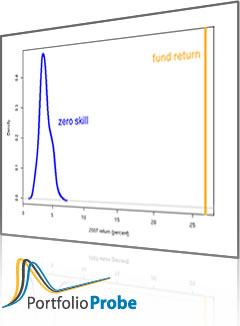Follow us using:
Newsletter Sign-up
Category Archives: R language
Some quibbles about “The R Book” by Michael Crawley
A friend recently bought The R Book and I said I would tell him of problems that I’ve noticed with it. You can eavesdrop. Page 4 The word “library” is used instead of “package”. This (common) error substantially raises the blood pressure of some people — probably to an unwarranted extent. An R package is … Continue reading
Bear hunting
When were there bear and bull markets in US stocks since 1950? Smoothing While we’d really like to estimate the expected return at each point in time, finding bear markets is ambitious enough. The plan starts by smoothing the daily returns through time, as in Figure 1. Figure 1: Smoothed returns with a 4 year … Continue reading
Joy of Stats coming soon
The Joy of Stats really is a joy. It will be shown on BBC4, apparently scheduled for December 7. (That date comes from Hans Rosling on twitter, I haven’t found scheduling evidence at the BBC.) I saw its debut at the Royal Statistical Society on World Statistics Day. Here is a five minute excerpt: You … Continue reading
Posted in R language, Statistics
8 Comments
Yet another inferno
Many from the R world will know The R Inferno. Abstract: If you are using R and you think you’re in hell, this is a map for you. A newly minted inferno is The 9 circles of scientific hell. Most amusing to me is Circle 4: p-value fishing, the punishment of which is brilliant. As … Continue reading
Posted in R language, Statistics
Leave a comment
Were stock returns really better in 2007 than 2008?
We know that the S&P 500 was up a little in 2007 and down a lot in 2008. So on the surface the question seems really stupid. But randomness played a part. Let’s have a go at deciding how much of a part. Figure 1: Comparison of 2007 and 2008 for the S&P 500. Statistical … Continue reading
R is a name you need to know
As if that is news to some of you. Forbes has a Mean Business blog post by Steve McNally titled “Names You Need to Know in 2011: R Data Analysis Software”. The post includes several links to why R is wonderful. It also includes a pretty — but seemingly useless — statistical graph. Correct me … Continue reading
Posted in R language, Statistics
3 Comments
The ARORA guessing game
The game ARORA (A random or real array) is a website that gives you two time series at a time. Your job is to guess which series is real market data and which is permuted data. It’s fun — try it. With some practice you will probably be able to guess which is which well … Continue reading
Posted in Fund management in general, R language
Tagged ARORA, financial Turing test, technical analysis
Leave a comment
Ideas for World Statistics Day
World Statistics Day is 2010 October 20. If you work with data or you should, then you are a statistician and this is a day for you. Try the Monty Hall problem on your mother. Start reading Bad Science. I mean the book, but here’s the blog. Take a step towards breaking your spreadsheet addiction … Continue reading
American TV does cointegration
Fringe provides an excellent example of cointegration. This is a television show in which there are two adjacent universes. The universes are almost alike but not exactly. Now, everyone knows that history is chaotic. If a butterfly does an extra flap of its wings, then that difference spreads out to change subsequent events everywhere. But … Continue reading
A tale of two returns
It was the best of times, it was the worst of times. As you may have guessed, this is a mashup of a novel by Charles Dickens and an explanation of financial returns. The key plot element of A Tale of Two Cities is that there are two men, Charles Darnay and Sydney Carton, who … Continue reading
Posted in Quant finance, R language
Tagged aggregate returns, arithmetic return, arithmetic return vs geometric return, continuously compounded returns, geometric return, geometric return vs arithmetic return, gross return, log return, log return vs simple return, net return, simple return, simple return vs log return, total return
48 Comments
